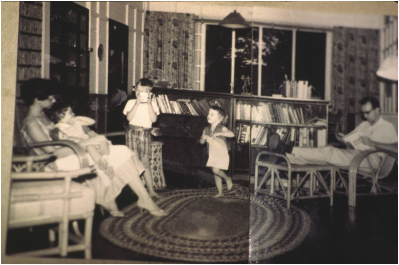
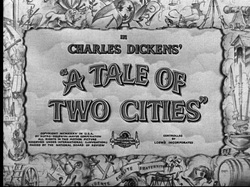
Tonight daddy’s relaxed, he’s not tense or angry from work. He blesses the food with special fervor and jokes as we chomp on his favorite supper: breaded pork chops, rice with pechay and pineapple upsidedown cake for dessert.
He’s still laughing when Scott pipes up,
“Daddy, tell about the two cities!” Johanna and I hold our breath.
“Oh, the tale of two cities…”
His hazel eyes sparkle behind his thick glasses as he warms to his subject and shifts into a New York accent (“boids”, “beudiful”). Mom interrupts,“Only a few stories before bedtime.Two trips to the kitchen, brush your teeth and get ready for bed.”
Fresh in our pjs we gather in the sala. For a little while we will fly like the Peter Pan kids out over the rooftops of muggy Manila to New York’s granite sidewalks. Manila doesn’t make it easy. From the abaca rug where we sit, the large screen window is black eye peering. Our dark front yard churs with cicadas. A gecho burps somewhere in the eves. Mom whacks a mosquito on her arm.
Daddy leads us out of this world, like Peter Pan. Yellow lamplight gleams off his wide forehead as he leans toward us, bright all the way to his ears. “When I was at Wooster – before I met your ever-lovin’ muther” (he turns happily to mom with now sleepy Johanna on her lap), “we read Charles Dicken’s A Tale of Two Cities.”
Dad pauses, raises his right arm, palm out and intones with a preachers’ voice,
it was the best of times, it was the worst of times
it was the age of wisdom, it was the age of foolishness,
it was the season of Light, it was the season of Darkness,
it was the spring of hope, it was the winter of despair…”
A quiet rapture descends upon us.
"So in a Tale of Two Cities a horse drawn carriage is racing down the street, then wham! (his hand slaps air) it slams into a poll! The carriage door swings open and a huge barrel of wine rolls out into the street! Out of nowhere, poor people scramble on the wine like flies, scooping up the pools of wine and disappear….”.
He looks both ways, sees at us gaping, and turns on his preacher voice,“Weellll, I thought to myself, ‘I know a story like that when I was a kid–-like you, Scott–-in New York City.' It was Prohibition. All over the country, no liquor! Your mother would like that,” he chuckles and winks at her.
“Uncle Bill made liquor in his tub He had a bar with Aunt Helen.” We later learn from Aunt Helen that Uncle Bill’s bar fed folks during the Depression. We cheered on his civil disobedience.
“You know,” (Daddy wanders when he talks New York), “all the mothers in our tenement block, they’d plump pillows on their windowsills, and sit there and call to each other across the way, or just rest and look out. You’d see them from the street. My mother checked in me that way. She’d call, ‘Richie! My mother cleaned the stairwell." We nod. "..for the rent, even then she was hacking with TB. My dad worked at the Sunshine Biscuit Factory. They didn’t have much time for Erna and me.”
YAWOOORwww. The cat fight stops the crickets. We wait a while. Mom shifts her position under Johanna, who is slumped in sleep. A cavalcade of gamugamo (moths) cluster at the yellow lamp and some are landing on her hair.
“Where was I, oh yeah. So it was a day that nothing was really happening, the mothers are calling to each other from their pillows. I think it was Sunday afternoon since Uncle Paul. He was my mother's brother, staying with us.
He was at the window with me, when out of nowhere, this white bakery truck comes racing down First Avenue. It skips the curb, and –bam!– hits the lamp post at 81st Street in front of the Irving Savings Bank building.
The back door flings open, and what do you know, out into the street roll bottles and bottles, and bottles, a truckload of liquor! You should ‘a seen those windows clear out! (he’s laughing), the whole neighborhood is down on the street – including Uncle Paul -- quiet, not a word, and just as quick they’re gone. Not a bottle left.
The best of times, the worst of times.” We murmur as we shuffle off to bed in the muggy Manila night.
He’s still laughing when Scott pipes up,
“Daddy, tell about the two cities!” Johanna and I hold our breath.
“Oh, the tale of two cities…”
His hazel eyes sparkle behind his thick glasses as he warms to his subject and shifts into a New York accent (“boids”, “beudiful”). Mom interrupts,“Only a few stories before bedtime.Two trips to the kitchen, brush your teeth and get ready for bed.”
Fresh in our pjs we gather in the sala. For a little while we will fly like the Peter Pan kids out over the rooftops of muggy Manila to New York’s granite sidewalks. Manila doesn’t make it easy. From the abaca rug where we sit, the large screen window is black eye peering. Our dark front yard churs with cicadas. A gecho burps somewhere in the eves. Mom whacks a mosquito on her arm.
Daddy leads us out of this world, like Peter Pan. Yellow lamplight gleams off his wide forehead as he leans toward us, bright all the way to his ears. “When I was at Wooster – before I met your ever-lovin’ muther” (he turns happily to mom with now sleepy Johanna on her lap), “we read Charles Dicken’s A Tale of Two Cities.”
Dad pauses, raises his right arm, palm out and intones with a preachers’ voice,
it was the best of times, it was the worst of times
it was the age of wisdom, it was the age of foolishness,
it was the season of Light, it was the season of Darkness,
it was the spring of hope, it was the winter of despair…”
A quiet rapture descends upon us.
"So in a Tale of Two Cities a horse drawn carriage is racing down the street, then wham! (his hand slaps air) it slams into a poll! The carriage door swings open and a huge barrel of wine rolls out into the street! Out of nowhere, poor people scramble on the wine like flies, scooping up the pools of wine and disappear….”.
He looks both ways, sees at us gaping, and turns on his preacher voice,“Weellll, I thought to myself, ‘I know a story like that when I was a kid–-like you, Scott–-in New York City.' It was Prohibition. All over the country, no liquor! Your mother would like that,” he chuckles and winks at her.
“Uncle Bill made liquor in his tub He had a bar with Aunt Helen.” We later learn from Aunt Helen that Uncle Bill’s bar fed folks during the Depression. We cheered on his civil disobedience.
“You know,” (Daddy wanders when he talks New York), “all the mothers in our tenement block, they’d plump pillows on their windowsills, and sit there and call to each other across the way, or just rest and look out. You’d see them from the street. My mother checked in me that way. She’d call, ‘Richie! My mother cleaned the stairwell." We nod. "..for the rent, even then she was hacking with TB. My dad worked at the Sunshine Biscuit Factory. They didn’t have much time for Erna and me.”
YAWOOORwww. The cat fight stops the crickets. We wait a while. Mom shifts her position under Johanna, who is slumped in sleep. A cavalcade of gamugamo (moths) cluster at the yellow lamp and some are landing on her hair.
“Where was I, oh yeah. So it was a day that nothing was really happening, the mothers are calling to each other from their pillows. I think it was Sunday afternoon since Uncle Paul. He was my mother's brother, staying with us.
He was at the window with me, when out of nowhere, this white bakery truck comes racing down First Avenue. It skips the curb, and –bam!– hits the lamp post at 81st Street in front of the Irving Savings Bank building.
The back door flings open, and what do you know, out into the street roll bottles and bottles, and bottles, a truckload of liquor! You should ‘a seen those windows clear out! (he’s laughing), the whole neighborhood is down on the street – including Uncle Paul -- quiet, not a word, and just as quick they’re gone. Not a bottle left.
The best of times, the worst of times.” We murmur as we shuffle off to bed in the muggy Manila night.
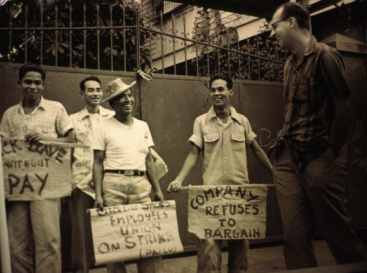
First Industrial Evangelism Conference, 1958
It was still the best of times in Asia, an era of newly independent states, nationalist fervor, cultural revolutions, political immaturity and industrialization. Asia was ready to move from agrarian economy to heavy industry, and the Philippines, with special help from American business, was bursting with promise.
But those twenty three American bases maul Philippine dignity. My father writes in August 1957 about nationalism and anti-Western tensions. “One of the bone of contentions here, as throughout Asia, is the American bases’ issue, which is seen by Filipinos as “another form of extra-territoriality” especially when acts committed by American service personnel against Flipinos are presumed under American military jurisdiction."
In our picture book, there’s a black and white photo of beautiful brown men laughing at the camera, one in a sarong. They pose with the langorous charisma of movie stars, joking as they stand by our swing set in the front yard. Under the picture, dad’s written, “First Industrial Evangelism Conference, 1958,” a year after we arrive in Manila.
They come for dinner. “Elena, we’re going to have 18 men to dinner!” mom says," what will we feed them?" Elena laughs,18 men! Mom says, we need something that can cover India, Pakistan, Hong Kong, Burma, Japan and Korea. Daddy forgets to kiss us when he pulls out the screen door. They come in, shake mom’s hand. The aura shimmers in our sala, you can almost see it, all the white teeth when their voices rise and fall. They say, “strike,” “labor union,” “justice,” “industrial workers,” “factory ministry” keywords we hear every year and in every accent at the table that night.
There are a few white men like daddy. Thomas Thomas, an Aussy with a funny name and red hair sees me hiding. “Crikey, come here honey,” he pulls out a stuffed koala bear and I hold its blond fur to my face. We love that koala til its eyes pop out and nose rubs off.
Soon after that conference, Mr Montes, Filipino labor lawyer assigned to work with dad - organize a “Young Workers in Industry” conference to look at the relationship of Christian vocation and work. The workers arrived from the dessicated coconut industry, a shoe factory, thread mill, bottling plant, and telephone company and talked for many hours about the stresses of their work – job security, sexual harassment towards women, boredom, the sense of inferiority and vulnerability.
It was still the best of times in Asia, an era of newly independent states, nationalist fervor, cultural revolutions, political immaturity and industrialization. Asia was ready to move from agrarian economy to heavy industry, and the Philippines, with special help from American business, was bursting with promise.
But those twenty three American bases maul Philippine dignity. My father writes in August 1957 about nationalism and anti-Western tensions. “One of the bone of contentions here, as throughout Asia, is the American bases’ issue, which is seen by Filipinos as “another form of extra-territoriality” especially when acts committed by American service personnel against Flipinos are presumed under American military jurisdiction."
In our picture book, there’s a black and white photo of beautiful brown men laughing at the camera, one in a sarong. They pose with the langorous charisma of movie stars, joking as they stand by our swing set in the front yard. Under the picture, dad’s written, “First Industrial Evangelism Conference, 1958,” a year after we arrive in Manila.
They come for dinner. “Elena, we’re going to have 18 men to dinner!” mom says," what will we feed them?" Elena laughs,18 men! Mom says, we need something that can cover India, Pakistan, Hong Kong, Burma, Japan and Korea. Daddy forgets to kiss us when he pulls out the screen door. They come in, shake mom’s hand. The aura shimmers in our sala, you can almost see it, all the white teeth when their voices rise and fall. They say, “strike,” “labor union,” “justice,” “industrial workers,” “factory ministry” keywords we hear every year and in every accent at the table that night.
There are a few white men like daddy. Thomas Thomas, an Aussy with a funny name and red hair sees me hiding. “Crikey, come here honey,” he pulls out a stuffed koala bear and I hold its blond fur to my face. We love that koala til its eyes pop out and nose rubs off.
Soon after that conference, Mr Montes, Filipino labor lawyer assigned to work with dad - organize a “Young Workers in Industry” conference to look at the relationship of Christian vocation and work. The workers arrived from the dessicated coconut industry, a shoe factory, thread mill, bottling plant, and telephone company and talked for many hours about the stresses of their work – job security, sexual harassment towards women, boredom, the sense of inferiority and vulnerability.
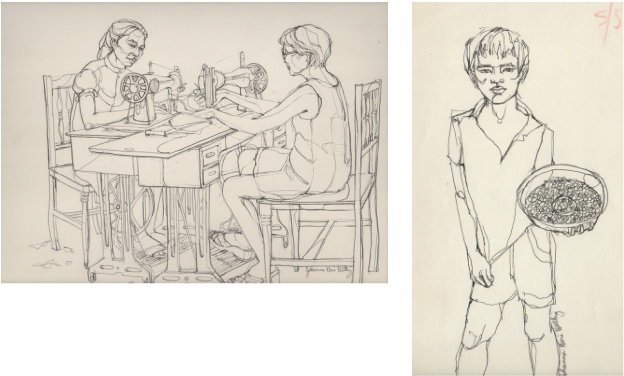
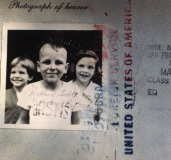
 RSS Feed
RSS Feed
